Looking for the best hikes in Portland? Well, you’ve come to the right place!
Portland is known as a great jumping-off point for top-notch hikes. Or as some world-class hikers attested: Portland is also home to the longest soft-surface hiking trails.
With 198 trails occupying the lush urban area, hiking in Portland guarantees easy access to the great outdoors.
Without further ado, here are the eight best Portland hikes you can’t forget.
1. Ridge Trail
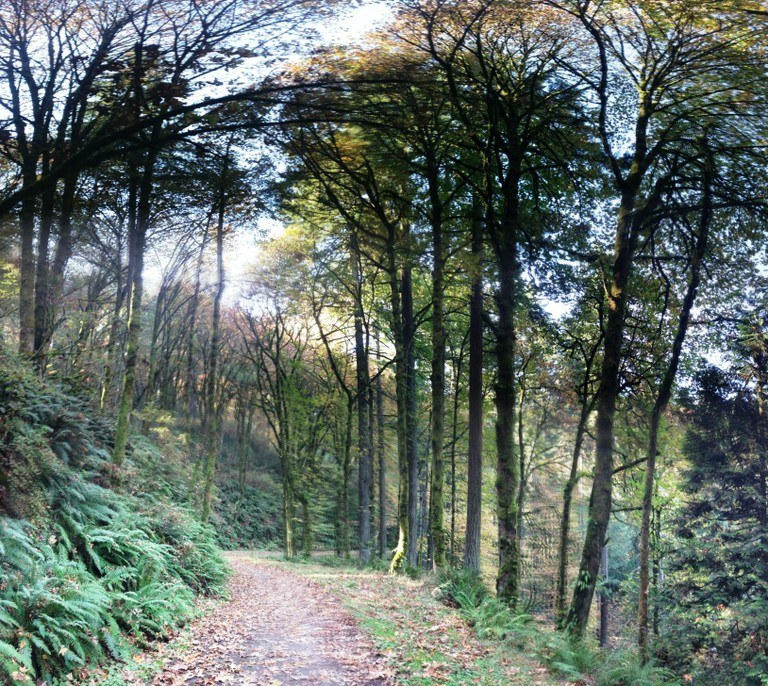
Ridge Trail is undoubtedly one of the best starter hikes. A short hike, mostly shaded with moderate elevation gain, offers a glimpse of Steinman’s notorious St. Johns Bridge looming behind the abundant trees. This is also the most scenic part of the workout as you get to contemplate the first solid steel frame reinforcement used in bridge construction of the time rather than rebar.
To complete a round trip of Ridge Trail, you don’t need to go over 4.3 miles. The short trail begins from the west bank of the Willamette River and segues into the spine of the Tualatin Mountains. Despite it being a short and easy hike, Ridge Trail is never too crowded to walk this seven-million-year-old geologic formation.
The first 1.4 miles of the hike are the hardest to climb, with the highest elevation gain reaching 982 feet. However, the climb soon pares down before splitting into two different tributaries of Leif Erikson Drive. Once the drippy weather is gone, the old forest floor starts to get muddy at the first section of Leif Erikson so be mindful if you decide to move on to this hike.
2. Forest Park Trails
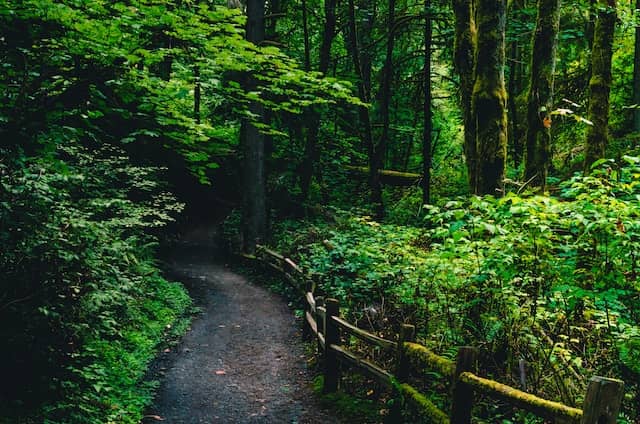
Serpentine deeper into the dramatic urban escape of Forest Park and you’ll be greeted by at least eight trails of all difficulty levels. We’re addressing famous household names like Tolinda, Dogwood, Wildwood, and Audubon Society Loop.
First thing first, we have Tolinda Trail, a challenging call hurdling nearly 400 feet within its first mile before Leif Erikson looms in front of you. On the flip side, a complete solitude takes over the space, with wild lilies and a sunny meadow making way for your mental health to detox.
About 15 minutes southeast of Tolinda Trail following 53rd Drive, you’ll end up at Dogwood Trailhead. Over here, doug fir and bigleaf maples define the beauty of the trail’s opening, signaling an easy one-mile point-to-point trail where many pet parents and families with kids call it home.
The last call, Audubon Society, is inarguably our favorite trail to hike in Forest Park. This is definitely a birders’ paradise, with more than 40 different species calling it home. Common feathery friends like sparrows, warblers, and pilate woodpeckers are often found pecking at your workout behind the branches.
The Audubon Society Loop is split into north and south. While the north side is where all the gift shops and wildlife centers concentrate, the south side promises more solitude on a longer and steeper terrain with better views.
3. Wildwood Traverse Hike
In Portland, they talk a lot about Wildwood Trail. But have you ever heard of Wildwood Traverse Hike? If not, let us walk you in on a little secret: this extensive hike is not even close to an easy walk. The entire point-to-point trail demands over two hours of hiking, starting from the Newberry Road Trailhead to Wildwood Trail.
Finishing this hike in a day is a dream for many people, but think twice especially if your knees can barely handle sudden ups and downs.
But all things come to those who wait. Hiding under those giant thickets of red alder, maple, and western red cedar is a series of many inclines and declines. It’s a no-brainer that you have to keep your eyes close on the steps at all times. One bounce appears after another, requiring you to come back right up after you go down.
The highest elevation gain surges 640 feet when you get to the Balch Creek area. Along the way, expect elks to get in the way, so look out for signs if you don’t wanna run into those giant companions swooping through the trees.
4. Hoyt Arboretum Trails
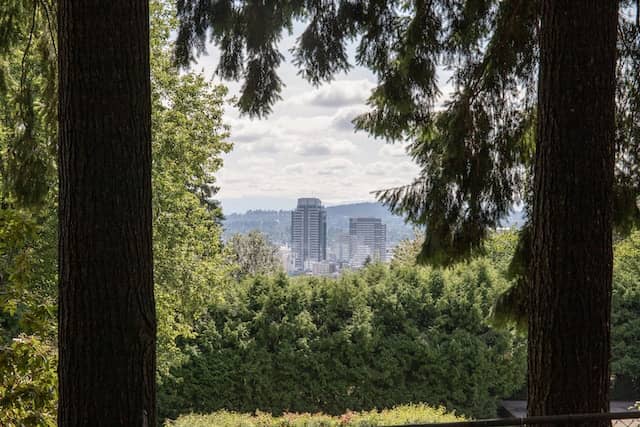
Dubbed as one of the closest trails to Portland downtown, Hoyt Arboretum is home to 12 miles of forested trails crisscrossing through a 190-acre park. Start from the central parking lot near the Visitor Center and work your way out to one of the three nearest hikes, including Wildwood Trail, White Pine Trail, and Bristlecone Trail. If you’re a first-timer here, take one of the trail maps at the Visitor Center so you won’t get lost.
While the Wildwood is undoubtedly the most talked-about hike, we’d like to start west from the parking lot, following SW Fischer Lane, and take a brief break at the Bamboo Garden before moving on to Bristlecone Trail. The Bamboo Garden in Hoyt Arboretum is a magical hideout with a scenic wooden deck. It’s not even a vast area but the slow-growing varieties of bamboo swathing a large hanging sphere sculpture makes it some of the best hidden gems to explore.
From there, meander north along the Bristlecone Trail until you see a shortcut into Johnson Creek. At this part, you’ve already made it back on the Wildwood Trail that’s almost swallowed by the towering redwood trees. You will like to linger by the Redwood Observation Deck for a while to watch birds and look up to contemplate the trees.
To make a complete loop, keep walking past the Wedding Meadow cutting through SW Fairview Blvd and Winter Garden before coming back to the Volcano Vista and ending the hike.
5. Lower MacLeay Trail
Considered a moderately challenging hike, Lower MacLeay Trail is a small stretch of forested walk cutting through the southern spine of the Forest Park. It begins at Lower MacLeay Park and runs southwest towards Witch’s Castle. To make it an out-and-back trail, keep meandering east along the Wildwood Trail until you see the 1914 heritage Pittock Mansion.
The entire hike from Lower MacLeay Park to Pittock’s Mansion is roughly five miles with an elevation gain of 922 feet.
As the trail crosses through a great diversity of terrain, expect to catch a glimpse of thickets of medium-growth douglas fir, big-leaf maple, and vine maples. Avid birders also call this hike home, while fishers like to gather down the Balch Creek trying to spot native cutthroat trout during their hike.
6. Tryon Creek State Natural Area Trails
A bit further afield, Tryon Creek State Natural Area appears after a short 15-minute car drive from downtown Portland. It opens out to at least five major trails radiating out from the convergent point of Park Creek, Tryon Creek, and Palatine Hill Creek.
Right here, the luxurious forested land welcomes dog walkers, hikers, and even horse riders on any given sunny day. With a verdant ravine serving as a bloodline of the nature reserve, you’re promised a great opportunity to hear chatters of feathery jays and squirrels in a peaceful setting.
The most popular trail here is a two-mile loop with 292 meters of elevation gain. The whole loop demands no more than an hour to complete, though minor ups and downs with narrow pathways require attention.
Another easy call in this area is the Old Man Trail Loop setting out from a small area called Friends Of Tryon Creek. It goes north with a U-turn down to Middle Creek Trail along Tryon Creek. This one is way shorter at only 1.2 miles to complete.
Overall, all the trails with different turnoffs at the Tryon Creek State Natural Area make it challenging for first-timers to spot the right direction but a handy map should do the trick.
7. Spring Water Trail
Officially known as the Springwater Corridor Trail, this trail is nowhere close to a short hike. At first glance, it appears to be an extensive string connecting the unincorporated community called Boring to SE 19th Avenue near Johnson Creek City Park. But this time, we want you to stick to the western segment of the hike so you can stay close to the downtown core.
The best place to start the hike is SE Johnson Creek Boulevard with an ample parking lot nearby. From there, head west along the whispering creek into the city center. You’ll be passing through multiple park sites and lively neighborhoods. Despite it being close to the happenings, it won’t take long to recognize a natural beauty right within the heart of the city.
One of our favorite things about beating this trail is a chance to steer clear of the public road. Immersing in various sceneries such as wetlands, buttes, agricultural fields, and pastures makes it such a charming hike to compare with others. Plus, a majority of the hike is well-paved, wide, and crisscrossing through city roads. For that reason, the elevation gain maintains as little as possible at only 200 feet.
8. Columbia River Gorge Trails
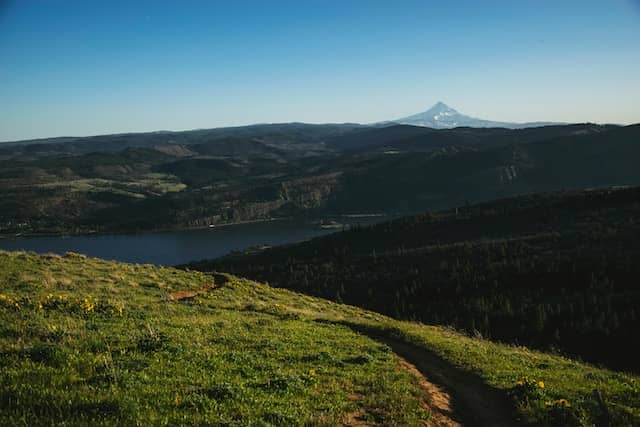
Columbia River Gorge is a world of its own. It’s no exaggeration to admit that the Gorge is dubbed as one of the most awe-inspiring trails in all of the United States.
The Gorge soars through the gigantic Columbia River, packing plenty of challenging trails crossing spectacular waterfalls, viewpoints, and even beaches. For that reason, getting back to the Gorge has never been the same, with various landscapes weaving a wave of colors no matter which season it is.
If you ask us which one to begin, the trail to Wahclella Falls is the way to go. It’s gorgeous, somehow otherworldly, especially when you press your nose against the cascading water pounding through the rocks. A loop around the fall is somewhere around two miles with 250 feet of elevation gain.
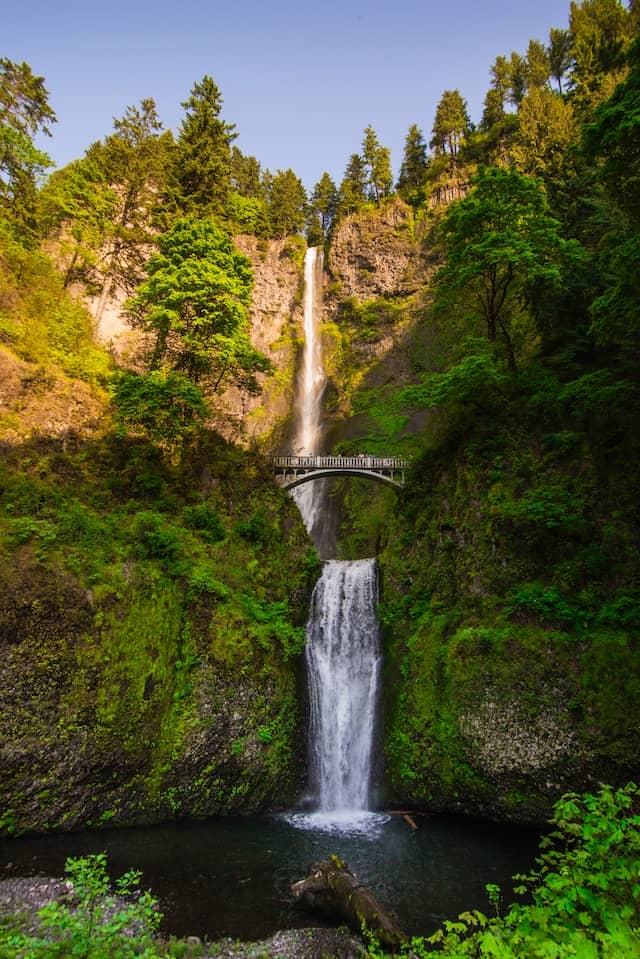
The next one, Multnomah Falls, is titled Portland’s most visited and highest waterfall trail. Ditching the crowds may be a luxury here but the way to the top of the fall is totally worth all the effort. Start early if you wanna get ahead of the crowds. Along the way, there are hidden viewpoints looking out at different angles of the falls.
The last hike, Rowena Crest Viewpoint, is famous for its Pinterest-ready hairpin turn flanked with wildflowers and fall foliage. There are two different trails that take you to the same viewpoint. One is the Rowena Plateau Trail, easier and shorter. It’s only one mile and reaches 100 feet in elevation gain. The other one, McCall Point Trail, puts more stress on your core with over 1000 feet in elevation gain and also longer at nearly four miles.
Portland is calling! Wondering what goes beyond the great trails? Check out this ultimate list of the best things to do in Portland and be inspired!
